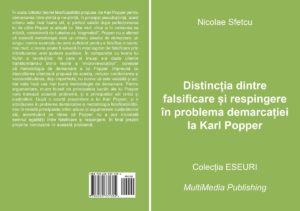 A scientific theory, according to Popper, can be legitimately saved from falsification by introducing an auxiliary hypothesis to generate new, falsifiable predictions. Also, if there are suspicions of bias or error, the researchers might introduce an auxiliary falsifiable hypothesis that would allow testing. But this technique can not solve the problem in general, because any auxiliary hypothesis can be challenged in the same way, ad infinitum. To solve this regression, Popper introduces the idea of a basic statement, an empirical statement that can be used both to determine whether a given theory is falsifiable and, if necessary, to corroborate falsification assumptions.
A scientific theory, according to Popper, can be legitimately saved from falsification by introducing an auxiliary hypothesis to generate new, falsifiable predictions. Also, if there are suspicions of bias or error, the researchers might introduce an auxiliary falsifiable hypothesis that would allow testing. But this technique can not solve the problem in general, because any auxiliary hypothesis can be challenged in the same way, ad infinitum. To solve this regression, Popper introduces the idea of a basic statement, an empirical statement that can be used both to determine whether a given theory is falsifiable and, if necessary, to corroborate falsification assumptions.
DOI: 10.13140/RG.2.2.22162.09923
Tag: falsification
The distinction between falsification and refutation in the demarcation problem of Karl Popper
 Despite the criticism of Karl Popper’s falsifiability theory for the demarcation between science and non-science, mainly pseudo-science, this criterion is still very useful, and perfectly valid after it was perfected by Popper and his followers. Moreover, even in his original version, considered by Lakatos as “dogmatic”, Popper did not assert that this methodology is an absolute demarcation criterion: a single counter-example is not enough to falsify a theory; a theory can legitimately be saved from falsification by introducing an auxiliary hypothesis. Compared to Kuhn’s theory of revolutions, which he himself later dissociated from it transforming it into a theory of “micro-revolutions,” I consider that Popper’s demarcation methodology, along with the subsequent development proposed by him, including the corroboration and the verisimilitude, though imperfect, is not only valid today, but it is still the best demarcation methodology. For argumentation, I used the main works of Popper dealing with this issue, and his main critics and supporters. After a brief presentation of Karl Popper, and an introduction to the demarcation problem and the falsification methodology, I review the main criticisms and the arguments of his supporters, emphasizing the idea that Popper has never put the sign of equality between falsification and rejection. Finally, I present my own conclusions on this issue.
Despite the criticism of Karl Popper’s falsifiability theory for the demarcation between science and non-science, mainly pseudo-science, this criterion is still very useful, and perfectly valid after it was perfected by Popper and his followers. Moreover, even in his original version, considered by Lakatos as “dogmatic”, Popper did not assert that this methodology is an absolute demarcation criterion: a single counter-example is not enough to falsify a theory; a theory can legitimately be saved from falsification by introducing an auxiliary hypothesis. Compared to Kuhn’s theory of revolutions, which he himself later dissociated from it transforming it into a theory of “micro-revolutions,” I consider that Popper’s demarcation methodology, along with the subsequent development proposed by him, including the corroboration and the verisimilitude, though imperfect, is not only valid today, but it is still the best demarcation methodology. For argumentation, I used the main works of Popper dealing with this issue, and his main critics and supporters. After a brief presentation of Karl Popper, and an introduction to the demarcation problem and the falsification methodology, I review the main criticisms and the arguments of his supporters, emphasizing the idea that Popper has never put the sign of equality between falsification and rejection. Finally, I present my own conclusions on this issue.
Keywords: Karl Popper, falsifiability, falsification, demarcation problem, pseudo-science
CONTENTS
Abstract
Introduction
1 The demarcation problem
2 Pseudoscience
3 Falsifiability
4 Falsification and refutation
5 Extension of falsifiability
6 Criticism of falsifiability
7 Support of falsifiability
8 The current trend
Conclusions
Bibliography
Notes
DOI: 10.13140/RG.2.2.22522.54725
(28.02.2019)
MultiMedia Publishing EPUB (ISBN 978-606-033-209-1), Kindle (ISBN 978-606-033-208-4), PDF (ISBN 978-606-033-207-7) https://www.telework.ro/ro/e-books/the-distinction-between-falsification-and-refutation-in-the-demarcation-problem-of-karl-popper/
The distinction between falsification and refutation in the demarcation problem of Karl Popper